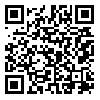BibTeX | RIS | EndNote | Medlars | ProCite | Reference Manager | RefWorks
Send citation to:
URL: http://journal.zums.ac.ir/article-1-2275-en.html
2- Dept. of Biology, Science and Research Branch, Islamic Azad University, Tehran, Iran
3- Dept. of Biology, Islamic Azad University, Shahr-e-Rey Branch, Shahr-e-Rey, Iran
4- Faculty of Medicine, Dept. of Biology, Islamic Azad University, Ardabil Branch, Ardabil, Iran ,
Background and Objective: It has been shown that cannabinoids exert widespread effects on cognitive functions. An overlapping distribution of GABA with cannabinoid receptors has been reported in some brain structures such as dorsal hippocampus. Thus, the functional interactions between cannabinoid and GABAergic systems in cognitive control seem possible. The present study evaluated the potential role of cannabinoid CB1 receptors of the dorsal hippocampus on muscimol induced amnesia and muscimol state-dependent memory in adult male mice. Materials and Methods: In this experimental study 250 adult male NMRI mice were entered. Drugs of muscimol and ACPA were used. Mice were anaesthetized and cannulae implantation was bilaterally used in the CA1 regions of the dorsal hippocampus via stereotaxic method. Seven days after recovery from surgery, the behavioral testing was started by means of inhibitory avoidance task. Results: Post-training injection of muscimol (0.075, 0.15 µg/mouse) impaired inhibitory avoidance memory. The memory impairment induced by ACPA (0.15 µg/mouse) was completely reversed by pre-test administration of ACPA and/or muscimol, suggesting muscimol induced state-dependent memory. Conclusion: These results suggest that cannabinoid CB1 receptors of the dorsal hippocampal may play an essential role in muscimol-induced amnesia and muscimol state-dependent memory in mice.
Received: 2013/08/20 | Accepted: 2013/09/16 | Published: 2013/09/16
| Rights and permissions | |
 |
This work is licensed under a Creative Commons Attribution-NonCommercial 4.0 International License. |




